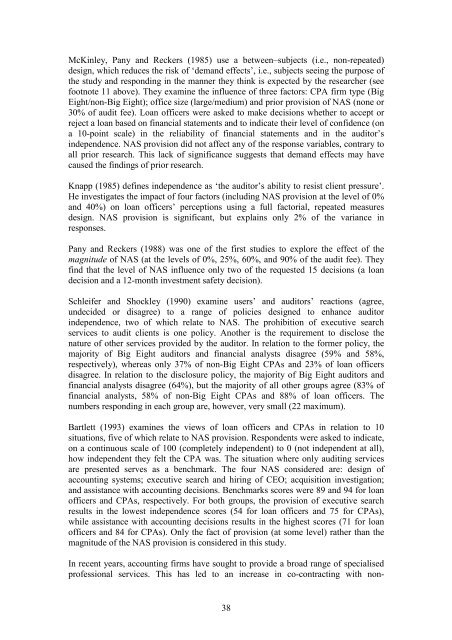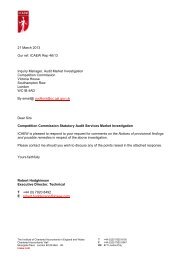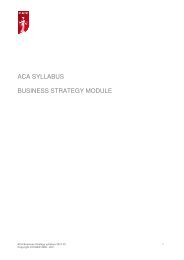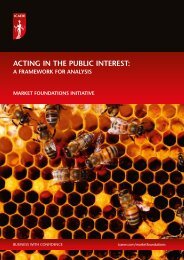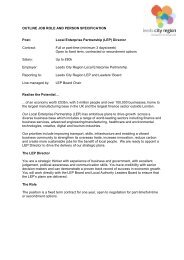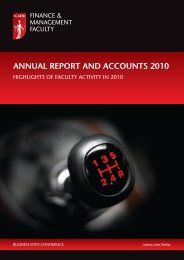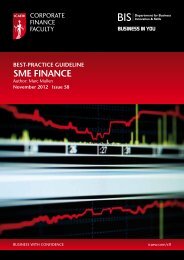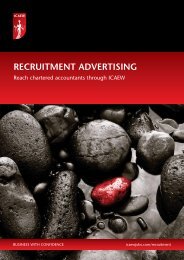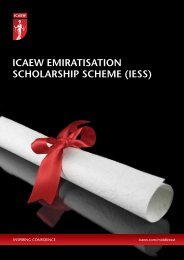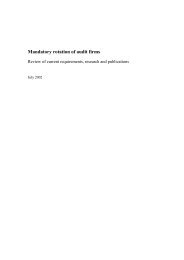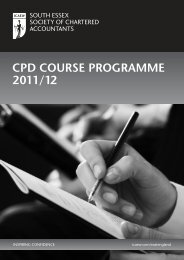Auditor independence and non-audit services - ICAEW
Auditor independence and non-audit services - ICAEW
Auditor independence and non-audit services - ICAEW
You also want an ePaper? Increase the reach of your titles
YUMPU automatically turns print PDFs into web optimized ePapers that Google loves.
McKinley, Pany <strong>and</strong> Reckers (1985) use a between–subjects (i.e., <strong>non</strong>-repeated)design, which reduces the risk of ‘dem<strong>and</strong> effects’, i.e., subjects seeing the purpose ofthe study <strong>and</strong> responding in the manner they think is expected by the researcher (seefootnote 11 above). They examine the influence of three factors: CPA firm type (BigEight/<strong>non</strong>-Big Eight); office size (large/medium) <strong>and</strong> prior provision of NAS (<strong>non</strong>e or30% of <strong>audit</strong> fee). Loan officers were asked to make decisions whether to accept orreject a loan based on financial statements <strong>and</strong> to indicate their level of confidence (ona 10-point scale) in the reliability of financial statements <strong>and</strong> in the <strong>audit</strong>or’s<strong>independence</strong>. NAS provision did not affect any of the response variables, contrary toall prior research. This lack of significance suggests that dem<strong>and</strong> effects may havecaused the findings of prior research.Knapp (1985) defines <strong>independence</strong> as ‘the <strong>audit</strong>or’s ability to resist client pressure’.He investigates the impact of four factors (including NAS provision at the level of 0%<strong>and</strong> 40%) on loan officers’ perceptions using a full factorial, repeated measuresdesign. NAS provision is significant, but explains only 2% of the variance inresponses.Pany <strong>and</strong> Reckers (1988) was one of the first studies to explore the effect of themagnitude of NAS (at the levels of 0%, 25%, 60%, <strong>and</strong> 90% of the <strong>audit</strong> fee). Theyfind that the level of NAS influence only two of the requested 15 decisions (a lo<strong>and</strong>ecision <strong>and</strong> a 12-month investment safety decision).Schleifer <strong>and</strong> Shockley (1990) examine users’ <strong>and</strong> <strong>audit</strong>ors’ reactions (agree,undecided or disagree) to a range of policies designed to enhance <strong>audit</strong>or<strong>independence</strong>, two of which relate to NAS. The prohibition of executive search<strong>services</strong> to <strong>audit</strong> clients is one policy. Another is the requirement to disclose thenature of other <strong>services</strong> provided by the <strong>audit</strong>or. In relation to the former policy, themajority of Big Eight <strong>audit</strong>ors <strong>and</strong> financial analysts disagree (59% <strong>and</strong> 58%,respectively), whereas only 37% of <strong>non</strong>-Big Eight CPAs <strong>and</strong> 23% of loan officersdisagree. In relation to the disclosure policy, the majority of Big Eight <strong>audit</strong>ors <strong>and</strong>financial analysts disagree (64%), but the majority of all other groups agree (83% offinancial analysts, 58% of <strong>non</strong>-Big Eight CPAs <strong>and</strong> 88% of loan officers. Thenumbers responding in each group are, however, very small (22 maximum).Bartlett (1993) examines the views of loan officers <strong>and</strong> CPAs in relation to 10situations, five of which relate to NAS provision. Respondents were asked to indicate,on a continuous scale of 100 (completely independent) to 0 (not independent at all),how independent they felt the CPA was. The situation where only <strong>audit</strong>ing <strong>services</strong>are presented serves as a benchmark. The four NAS considered are: design ofaccounting systems; executive search <strong>and</strong> hiring of CEO; acquisition investigation;<strong>and</strong> assistance with accounting decisions. Benchmarks scores were 89 <strong>and</strong> 94 for loanofficers <strong>and</strong> CPAs, respectively. For both groups, the provision of executive searchresults in the lowest <strong>independence</strong> scores (54 for loan officers <strong>and</strong> 75 for CPAs),while assistance with accounting decisions results in the highest scores (71 for loanofficers <strong>and</strong> 84 for CPAs). Only the fact of provision (at some level) rather than themagnitude of the NAS provision is considered in this study.In recent years, accounting firms have sought to provide a broad range of specialisedprofessional <strong>services</strong>. This has led to an increase in co-contracting with <strong>non</strong>-38


